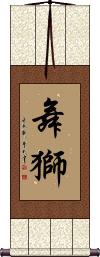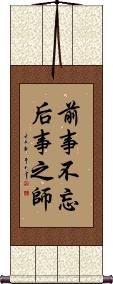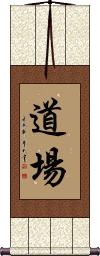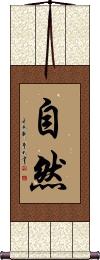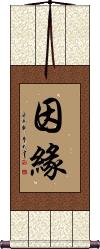Many custom options...
And formats...

Events in Chinese / Japanese...
Buy an Events calligraphy wall scroll here!
Personalize your custom “Events” project by clicking the button next to your favorite “Events” title below...
1. Lion Dance
2. Past experience is the teacher for the future
4. Nature
Lion Dance
Past experience is the teacher for the future
Past events not forgotten serve as teachers for later events.
The most literal translation to English of this ancient 前事不忘后事之师 Chinese proverb is:
“Past events not forgotten serve as teachers for later events.”
However, it's been translated several ways:
Don't forget past events, they can guide you in the future.
Benefit from past experience.
Past experience, if not forgotten, is a guide for the future.
Past calamity is my teacher.
A good memory for the past is a teacher for the future.
The remembrance of the past is the teacher of the future.
If one remembers the lessons of the past; They will serve as a guide to avoid mistakes in the future.
The origin:
This proverb comes from the 5th century B.C., just before the Warring States Period in the territory now known as China.
The head of the State of Jin, Zhi Bo, seized power in a coup. He did this with help from the armies of the State of Han and Wei. Instead of being grateful for the help from Han and Wei, he treacherously took the land of Han and Wei. Never satisfied, Zhi Bo employed the armies of Han and Wei to attack and seize the State of Zhao.
The king of Zhao took advice from his minister Zhang Mengtan and secretly contacted the Han and Wei armies to reverse their plans and attack the army of Zhi Bo instead. The plan was successful, and the State of Zhao was not only saved but was set to become a powerful kingdom in the region.
Zhang Mengtan immediately submitted his resignation to a confused king of Zhao. When asked why, Zhang Mengtan said, “I've done my duty to save my kingdom, but looking back at past experience, I know sovereign kings are never satisfied with the power or land at hand. They will join others and fight for more power and more land. I must learn from past experiences, as those experiences are the teachers of future events.”
The king could not dispute the logic in that statement and accepted Zhang Mengtan's resignation.
For generations, the State of Zhao continued to fight for power and land until finally defeated and decimated by the State of Qin (which led to the birth of the Qin Dynasty in 221 B.C.).
Dojo / Martial Arts Studio
道場 is the Japanese term for a room or hall in which martial arts are taught.
道場 is often spelled “dojo” which has become a word in the English lexicon. However, the true Romaji is doujou or dōjō.
Please note: The Chinese definition of these characters is quite different. In Chinese, this is a place where Buddhist or Taoist mass is held. It could also be a place where spiritual or psychic events are performed.
Nature
The natural world
自然 is the simple way to express nature in Chinese, Japanese Kanji, and old Korean Hanja.
This can also be translated as “the natural world.”
In Japanese and Korean, this term is sometimes used to signify spontaneity or a spontaneous act.
In the context of Taoism or Daoism, this is a key concept that literally means “of its own” or “by itself” and thus naturally, natural, spontaneously, freely, or in the course of events.
Also known as known as ziran or tzu-jan
Fate / Opportunity / Chance
The Buddhist idea of Fate
因緣 is the Buddhist concept of a chance meeting or an opportunity that presents itself by fate.
Sometimes this is used to describe a cosmic chain of events or cause and effect.
It also is used to describe predestined relationships between people - and sometimes married couples (although if you want one about marriage, try this: Fate / Destiny of Lovers.
因緣 can also be translated as origin, karma, destiny, affinity, connection, and relation. This all depends on context - seen alone on a wall scroll, this will be read with a “fate/chance” meaning by a Chinese person or a Korean person who can read Hanja.
The more complex definition of this word would be, “Direct causes and indirect conditions, which underlie the actions of all things.”
This concept is known as nidana in the original Sanskrit. Also sometimes presented as hetupratyaya (or “hetu and prataya”), which I believe is Pali.
Note: Japanese will tend to use this version of the second Kanji: ![]()
If you order this from the Japanese master calligrapher, expect that you’ll get this version. However, this word often carries a negative connotation in Japanese (bad things happen), as it is used that way in a certain Japanese idiom. Therefore, this may not be the best choice if Japanese is your target language.
See Also: Buddhism | Opportunity
Fall Down Seven Times, Get Up Eight
Always rising after a fall or repeated failures
七転八起 is a Japanese proverb that relays the vicissitudes of life, with the meaning “seven times down eight times up.”
Some would more naturally translate it into English as “Always rising after a fall or repeated failures” or compare it to the English, “If at first, you don't succeed, try, try again.”
The first Kanji is literally “7.” The second means “fall down” (sometimes this Kanji means “turn around,” “revolve” or “turn over” but in this case, it holds the meaning of “fall”). The third is “8.” And the last is “get up,” “rouse,” or “rise.”
Basically, if you fail 7 times, you should recover from those events and be prepared to rise an 8th time. This also applies if it is the world or circumstances that knock you down seven times...
...just remember that you have the ability to bounce back from any kind of adversity.
Note: This can be pronounced in two ways. One is “shichi ten hakki” or “shichitenhakki.” The other is “nana korobi ya oki” also written, “nanakorobi-yaoki.”
Special Note: The second character is a Kanji that is not used in China. Therefore, please select a Japanese calligrapher for this title.
These search terms might be related to Events:
Soldiers Adapt Actions to the Situation
Not the results for events that you were looking for?
Below are some entries from our dictionary that may match your events search...
| Characters If shown, 2nd row is Simp. Chinese |
Pronunciation Romanization |
Simple Dictionary Definition |
釋迦牟尼 释迦牟尼 see styles |
shì jiā móu ní shi4 jia1 mou2 ni2 shih chia mou ni Shakamuni |
More info & calligraphy: Shakyamuni / The Buddha釋迦文 (釋迦文尼); 釋伽文 Śākyamuni, the saint of the Śākya tribe. muni is saint, holy man, sage, ascetic monk; it is: intp. as 仁 benevolent, charitable, kind, also as 寂默 one who dwells in seclusion. After '500 or 550' previous incarnations, Śākyamuni finally attained to the state of Bodhisattva, was born in the Tuṣita heaven, and descended as a white elephant, through her right side, into the womb of the immaculate Māyā, the purest woman on earth; this was on the 8th day of the 4th month; next year on the 8th day of the 2nd month he was born from her right side painlessly as she stood under a tree in the Lumbinī garden. For the subsequent miraculous events v. Eitel. also the 神通遊戲經 (Lalitavistara), the 釋迦如來成道記, etc. Simpler statements say that he was born the son of Śuddhodana, of the kṣatriya caste, ruler of Kapilavastu, and Māyā his wife; that Māyā died seven days later, leaving him to be brought up by her sister Prājapati; that in due course he was married to Yaśodharā who bore him a son, Rāhula; that in search of truth he left home, became an ascetic, severely disciplined himself, and finally at 35 years of age, under a tree, realized that the way of release from the chain of rebirth and death lay not in asceticism but in moral purity; this he explained first in his four dogmas, v. 四諦 and eightfold noble way 八正道, later amplified and developed in many sermons. He founded his community on the basis of poverty, chastity, and insight or meditation, ad it became known as Buddhism, as he became known as Buddha, the enlightened. His death was probably in or near 487 B.C., a few years before that of Confucius in 479. The sacerdotal name of his family is Gautama, said to be the original name of the whole clan, Śākya being that of his branch, v. 瞿, 喬.; his personal name was Siddhārtha, or Sarvārthasiddha, v. 悉. |
件 see styles |
jiàn jian4 chien ken けん |
item; component; classifier for events, things, clothes etc (n,ctr) (1) matter; affair; case; item; subject; (counter) (2) counter for (received) emails, text messages, voicemail messages, etc.; (counter) (3) counter for accounts (on a website, email service, etc.); (female given name) Kudan |
屆 届 see styles |
jiè jie4 chieh kai |
to arrive at (place or time); period; to become due; classifier for events, meetings, elections, sporting fixtures, years (of graduation) reaches to |
数 see styles |
suu / su すう |
(prefix) (1) several; a number of; (n,n-suf) (2) quantity; amount; (3) counting; figures; numbers; (4) number; numeral; figure; (5) {gramm} number; (6) destiny; fate; course of events; trend; (surname) Suzaki |
檔 档 see styles |
dàng dang4 tang |
(bound form) shelves (for files); pigeonholes; (bound form) files; crosspiece (of a table etc); (bound form) (of goods) grade; vendor's open-air stall; (Tw) timeslot for a show or program; classifier for shows; classifier for events, affairs etc; Taiwan pr. [dang3] |
次 see styles |
cì ci4 tz`u tzu tsugi つぎ |
next in sequence; second; the second (day, time etc); secondary; vice-; sub-; infra-; inferior quality; substandard; order; sequence; hypo- (chemistry); classifier for enumerated events: time (noun - becomes adjective with の) (1) next; following; subsequent; (noun - becomes adjective with の) (2) stage; station; (personal name) Yadoru Second, secondary; a turn, next. |
毎 see styles |
měi mei3 mei mai まい |
Japanese variant of 每 (prefix) every (usu. with events, e.g. every weekend); each; (female given name) Mai |
起 see styles |
qǐ qi3 ch`i chi hajime はじめ |
to rise; to raise; to get up; to set out; to start; to appear; to launch; to initiate (action); to draft; to establish; to get (from a depot or counter); verb suffix, to start; starting from (a time, place, price etc); classifier for occurrences or unpredictable events: case, instance; classifier for groups: batch, group (irregular okurigana usage) source; origin; cause; beginning; genesis; (female given name) Hajime To rise, raise, start, begin; uprising; tr. utpada. |
輪 轮 see styles |
lún lun2 lun rin りん |
wheel; disk; ring; steamship; to take turns; to rotate; classifier for big round objects: disk, or recurring events: round, turn (counter) counter for wheels and flowers; (female given name) Run cakra; wheel, disc, rotation, to revolve; v. 研. The three wheels are 惑業苦illusion, karma, suffering, in constant revolution. The five are earth, water, fire, wind, and space; the earth rests on revolving spheres of water, fire, wind, and space. The nine are seen on the tops of pagodas, cf. 九輪.; The two wheels of a cart compared by the Tiantai school to 定 (or to its Tiantai form 止觀) and 慧 meditation and wisdom; see 止觀 5. Also 食 food and 法 the doctrine, i. e. food physical and spiritual. |
遭 see styles |
zāo zao1 tsao sō |
to meet by chance (usually with misfortune); classifier for events: time, turn, incident to meet with |
陣 阵 see styles |
zhèn zhen4 chen jin じん |
disposition of troops; wave; spate; burst; spell; short period of time; classifier for events or states of short duration (1) (See 背水の陣) battle formation; (2) (See 陣を張る) camp; encampment; position; (n,n-suf) (3) (See 報道陣) group; gang; party; corps; (4) (See 大坂夏の陣) war; battle; campaign; (given name) Noburu a file of soldiers |
一環 see styles |
ikkan いっかん |
(1) link (e.g. in a chain of events); part (of a plan, campaign, activities, etc.); (can be adjective with の) (2) {bot} monocyclic; (personal name) Kazuwa |
三鐵 三铁 see styles |
sān tiě san1 tie3 san t`ieh san tieh |
triathlon (Tw); (athletics) throwing events excluding the hammer throw (i.e. discus, javelin and shot put) |
三項 三项 see styles |
sān xiàng san1 xiang4 san hsiang |
three items; three events; three terms; tri-; trinomial, ternary (math.); triathlon (abbr. for 三項全能|三项全能) |
不妙 see styles |
bù miào bu4 miao4 pu miao |
(of a turn of events) not too encouraging; far from good; anything but reassuring |
世運 世运 see styles |
shì yùn shi4 yun4 shih yün seiun; seun / seun; seun せいうん; せうん |
World Games; abbr. for 世界運動會|世界运动会[Shi4 jie4 Yun4 dong4 hui4] (rare) destiny of the world; course of events in the world |
事變 事变 see styles |
shì biàn shi4 bian4 shih pien |
incident; unforeseen event; events (in general) |
二事 see styles |
èr shì er4 shi4 erh shih niji |
two matters; two events |
佛忌 see styles |
fó jì fo2 ji4 fo chi butsuki |
major events of the life of the Buddha |
併催 see styles |
heisai / hesai へいさい |
(can act as adjective) (abbreviation) (from 併用開催) combining a pair of events; joint |
催物 see styles |
moyooshimono もよおしもの moyoushimono / moyoshimono もようしもの |
(ik) points of interest; tourist attraction; exhibit; events; amusements; (program of) entertainments (programme) |
前事 see styles |
qián shì qian2 shi4 ch`ien shih chien shih zenji |
past events; antecedent; what has happened prior event |
勢い see styles |
ikioi いきおい |
(adv,n) (1) force; vigor; vigour; energy; spirit; life; (2) influence; authority; power; might; (3) impetus; momentum; course (of events); (adverbial noun) (4) naturally; necessarily; (surname) Ikioi |
口徑 口径 see styles |
kǒu jìng kou3 jing4 k`ou ching kou ching |
bore; caliber; diameter; aperture; (fig.) stance (on an issue); version (of events); account; narrative; line See: 口径 |
報事 报事 see styles |
bào shì bao4 shi4 pao shih hōji |
retributive events |
報本 报本 see styles |
bào běn bao4 ben3 pao pen hōhon |
commemorating the life events of the Buddha |
大歌 see styles |
oouta / oota おおうた |
(hist) court song sung at religious services and celebratory events |
帰趣 see styles |
kishu きしゅ |
(1) outcome (of a course of events); consequence; (noun/participle) (2) tendency; trend; drift |
帰趨 see styles |
kisuu / kisu きすう kishu きしゅ |
(1) outcome (of a course of events); consequence; (noun/participle) (2) tendency; trend; drift |
年占 see styles |
toshiura としうら |
(See 年見) divination that predicts the events of the whole year (esp. concerning crops) |
Click here for more events results from our dictionary
The following table may be helpful for those studying Chinese or Japanese...
| Title | Characters | Romaji (Romanized Japanese) | Various forms of Romanized Chinese | |
| Lion Dance | 舞獅 舞狮 | wǔ shī / wu3 shi1 / wu shi / wushi | wu shih / wushih | |
| Past experience is the teacher for the future | 前事不忘后事之師 前事不忘后事之师 | qián shì bú wàng hòu shí zhī shī qian2 shi4 bu2 wang4 hou4 shi2 zhi1 shi1 qian shi bu wang hou shi zhi shi | ch`ien shih pu wang hou shih chih shih chien shih pu wang hou shih chih shih |
|
| Dojo Martial Arts Studio | 道場 道场 | dou jou / doujou / do jo | dào cháng dao4 chang2 dao chang daochang | tao ch`ang taochang tao chang |
| Nature | 自然 | shi zen / shizen | zì rán / zi4 ran2 / zi ran / ziran | tzu jan / tzujan |
| Fate Opportunity Chance | 因緣 因缘 / 因縁 | in nen / innen | yīn yuán / yin1 yuan2 / yin yuan / yinyuan | yin yüan / yinyüan |
| Fall Down Seven Times, Get Up Eight | 七転八起 | shichi ten hakki / nana korobi ya oki shichi ten haki / nana korobi ya oki | ||
| In some entries above you will see that characters have different versions above and below a line. In these cases, the characters above the line are Traditional Chinese, while the ones below are Simplified Chinese. | ||||
Successful Chinese Character and Japanese Kanji calligraphy searches within the last few hours...
